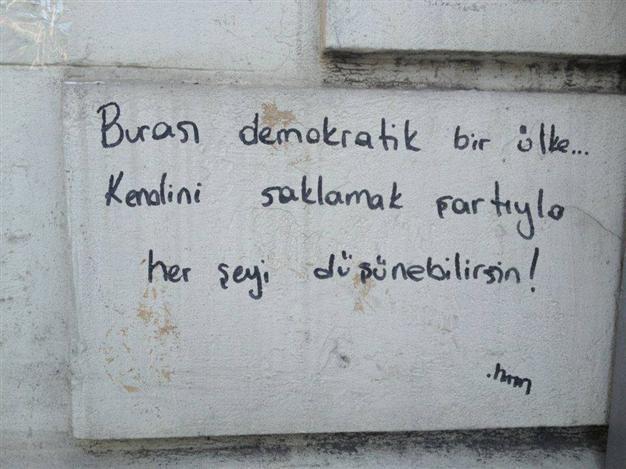Turkish student handed five months in jail for ‘F*** your religion’ graffiti
ESKİŞEHİR İsmail Saymaz

A random wall painting.
A university student has been sentenced to five months in prison for writing “F*** your religion” on walls in the western city of Eskişehir during this year’s May Day demonstration.Prosecutors had accused the defendant, identified only by his initials D.D., of “humiliating all religious values of a pious country,” also arguing that the graffiti could potentially “disrupt public peace” because of its provocative nature.
During the trial, D.D. denied that he intended to insult religion, saying he wrote the graffiti inspired by the lyrics of a song by the overtly political hardcore punk rock band “The Exploited.” He even denied knowing speaking English and knowing the Turkish meaning of the “F-word.”
His lawyers argued that the graffiti did not specifically target Islam and stressed that the song in question criticized religion as a whole, which is considered as part of freedom of expression by the European Court of Human Rights (ECHR). They also rejected claims that the graffiti could lead to the disruption of public order, citing the fact that only 17 percent of the Turkish population knew English.
However, the local court in Eskişehir overseeing the case eventually found D.D. guilty, handing him a suspended five-month sentence.
In two high-profile recent cases, Turkish-Armenian linguist and writer Sevan Nişanyan and acclaimed pianist Fazıl Say were convicted of blasphemy for writing and endorsing statements critical of religion.
Nişanyan, who is currently serving a prison sentence on “illegal construction” claims, was handed a 3.5-month prison term for committing blasphemy against the Prophet Muhammad in a blog post.
Say, for his part, was sentenced to 10 months in prison in a retrial on charges of “insulting religion,” after he retweeted several lines attributed to the medieval Persian poet Omar Khayyam.
















